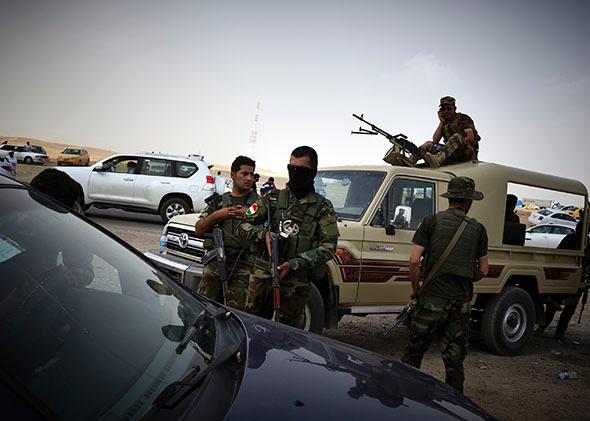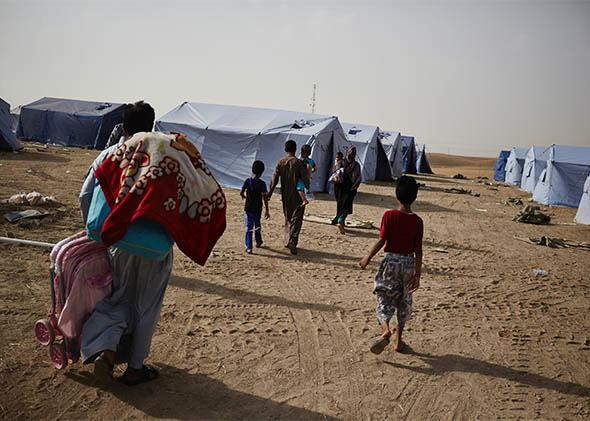As forces from the Islamic State of Iraq and Syria sweep across Iraq, conquering cities like Mosul and Tikrit, the Obama administration is pledging greater support for the Iraqi government. Yet even if the Iraqi army is able to stop ISIS’s advance on Baghdad, the violent jihadist group will likely retain control of vast swaths of Iraq and eastern Syria.
In a matter of days, ISIS’s bold and effective fighting in the heartland of the Arab world may have made it the pre-eminent force in the Sunni jihadist movement. It has now arguably eclipsed al-Qaida leader Ayman al-Zawahiri and his Pakistan-based terrorist core in the eyes of potential recruits and funders. Indeed, unlike al-Qaida, ISIS is on its way to controlling a quasi-state, exercising de facto sovereignty over a territory, even if unrecognized by the international community. The territory already under its control is larger than Israel, and it is not some barren desert: It includes oilfields, electrical grids, prisons, small manufacturing centers, and the weapon depots abandoned by the Iraqi military, including arms provided by the United States. When ISIS fighters conquered Mosul, they seized the central bank—and its reported $425 million. By comparison, al-Qaida’s budget before 9/11 was about $30 million—and we called it rich.
Everyone agrees an ISIS-controlled state could be deadly—but in what ways? We typically think of terrorist outfits like al-Qaida and ISIS as nonstate actors. But what does it mean when a nonstate actor carves itself a state?
The disaster is worst for those unlucky enough to find themselves living under ISIS rule. The jihadist group’s extreme ideology calls for killing or subjugating not only Christians and Jews, but also many Muslims. Shiite Muslims, who make up a majority in Iraq, are particularly hated for their supposed apostasy, as are the Alawites who rule in Syria. ISIS also targets Sunni Muslims, if the group believes that they are insufficiently zealous or have collaborated with the United States or its allies, including the current Iraqi government. In Syria, ISIS members shot and then crucified the bodies of their Muslim enemies, leaving their corpses to hang as warnings. Beheading is common. “Repent or die” is its motto. ISIS is so violent, al-Qaida leader Zawahiri disavowed the group in February, excoriating it for its brutality and attacks against other jihadist fighters. Half a million Iraqis fled Mosul as ISIS forces entered the city, and hundreds of thousands more will surely flee wherever ISIS goes.
If it consolidates power in the territory it now controls, ISIS can exploit the rewards other governments enjoy. It will sell oil from the fields under its control, smuggling out what can’t be sold legally. Millions will pour into its coffers. ISIS can also tax the businesses and residents that remain under its power. They will not offer rich pickings, given the war’s devastation, but they will still give ISIS wealth far beyond that of a typical terrorist group. ISIS can also levy troops, demanding that young Muslims serve in its ranks as proof of their loyalty, enabling it to expand its fighting forces. All this will probably be done inefficiently and will lead more people to flee, but ISIS will still emerge stronger.
It’s hard to speak of an ISIS “foreign policy,” at least in a traditional sense. Its central goal is the creation of an Islamic state—a goal it has sought to realize through brutality rather than diplomacy. But the group’s military blitz across Iraq has gone a long way to further discredit the government of Prime Minister Nouri al-Maliki—particularly after the Iraqi military chose to run instead of fight.
ISIS doesn’t respect state boundaries, believing they are artificial creations of colonial powers designed to divide the Muslim world, so moving the front from Iraq to Syria and back to Iraq is logical from its point of view. Indeed, ISIS sees the struggles in both countries as parts of a larger grand struggle against apostate-dominated regimes (Shiite in Iraq, Alawite in Syria) backed by Iran and the Lebanese Hezbollah. As sectarianism has grown, this conspiratorial view has become mainstream, with Shiites and Sunnis throughout the region seeing the conflict as existential. Lebanon is now facing a rash of bombings as the violence spreads. ISIS’s control of territory gives it a base to recruit, train, and plan attacks on neighboring lands. For now, because of its sectarian focus, ISIS sees the fight against those groups and governments it considers apostate as a higher priority than the fight against the United States, but the United States is also on ISIS’s list of enemies.
ISIS is already the primary magnet for the thousands of foreign fighters who have gone to Syria to oppose the Assad regime: One informed estimate puts the number of foreigners fighting with ISIS at 3,000. The group’s prestige will only soar on the back of this week’s victories. ISIS’s uncompromising ideology and its military effectiveness draw foreign Muslims to its banner, and ISIS often uses these recruits (many of whom are unskilled and, especially if from the West, may not speak Arabic) for suicide bombings. As foreigners integrate into ISIS, their personal networks are used to draw still more fighters to the cause. U.S. and European counterterrorism officials fear that these fighters could return to their home countries and sow terror there. Officials in Europe told me that some European Muslims are drawn to ISIS because they want to live in a real Islamic state—so much so they even bring their families with them. This allure will only grow as ISIS has an actual state for them to call home.
It is also true that ISIS will run into some trouble once it has an address. Just as ISIS hates everyone, so too does everyone hate ISIS. Even as it is taking on Assad and Maliki, ISIS fighters also kidnapped Turkish diplomats in Mosul, making Ankara more likely to assist ISIS’s enemies. Iraq’s Kurdish leaders and the Shiite-dominated government have little love for each other, but they will cooperate to contain ISIS. And as ISIS grows in power, the United States and other Western governments are more likely to hold their noses and aid regimes like Maliki’s despite its many abuses and weaknesses and despite the fact most Americans want to leave Iraq far behind. Should the U.S. and other governments decide to intervene more directly, ISIS’s newfound home could become a target-rich environment. A shadowy ISIS emerging at night to terrorize civilians is hard to strike; ISIS “government” facilities and leaders who operate in the open are far easier to target.

Photo by Sebastiano Tomada/Reportage by Getty Images
But perhaps the biggest weaknesses for this newly minted jihadist state will be internal. The tribal and regional divisions that plague Iraq and Syria do not go away under ISIS any more than they went away under Syrian, Iraqi, or U.S. control. ISIS has little interest in governing, but if it lingers for long it will have no choice, especially if it wants to prevent the entire population from fleeing. ISIS may be good at preaching fire and brimstone to motivate its followers to kill themselves and their enemies, but the bloodthirsty thug with an AK-47 isn’t much good at helping you find health care or repair your house after it’s been shelled. It can loot and terrorize, but the patient work of providing services or otherwise running a country are beyond it. Even more damning, the movement itself is prone to divisions—violent ones. Power is a function of charisma, not institutions, making rivalries more likely and creating vacuums when a leader is killed. Moreover, having opened the door to declaring other Muslims apostate, it is impossible to close it: You can always find some deviation to fight over or declare a rival insufficiently zealous. The presence of so many foreign fighters often makes this worse. Locals’ zealotry is tempered by their relatives and other personal connections to home; the true-believing foreigners often accept no compromises and, at the same time, their presence exacerbates local resentment and nationalism.
So an ISIS-controlled state will not expand indefinitely, and it may prove even more fragile than what it has already toppled. What follows after jihadist state collapses? That may be a chaos we can’t imagine.
